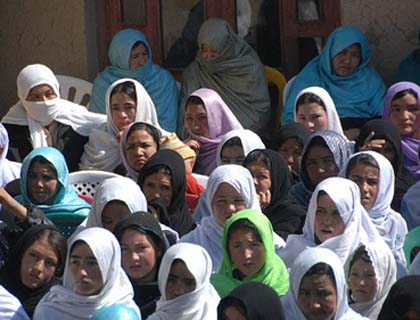A famous differently stated quote says a society is judged by the way it treats its women. Perfectly fit for Afghanistan, it not only shows the contradiction of women's social status in our society with that of the moral hyperbole of their rights bestowed by religion that we are always lectured about by clerics, but also possibly an important factor of the violent conflict.
A recent study by an American professor Valerie M. Hudson shows best predictor of a state's stability is how its women are treated. Details of the study to be released in a new book Sex and World Peace, in a recent article on the Foreign magazine she said, "Using the largest extant database on the status of women in the world today, we found that there is a strong and highly significant link between state security and women's security.
In fact, the very best predictor of a state's peacefulness is not its level of wealth, its level of democracy, or its ethno-religious identity; the best predictor of a state's peacefulness is how well its women are treated. What's more, democracies with higher levels of violence against women are as insecure and unstable as non-democracies."
She further says, "The larger the gender gap between the treatment of men and women in a society, the more likely a country is to be involved in intra- and interstate conflict, to be the first to resort to force in such conflicts, and to resort to higher levels of violence. On issues of national health, economic growth, corruption, and social welfare, the best predictors are also those that reflect the situation of women.
What happens to women affects the security, stability, prosperity, bellicosity, corruption, health, regime type, and (yes) the power of the state. The days when one could claim that the situation of women had nothing to do with matters of national or international security are, frankly, over. The empirical results to the contrary are just too numerous and too robust to ignore."
A comparative data-analysis can show how relevant the new study is to the state of women and conflict in Afghanistan. Latest reports by the Afghanistan Independent Human Rights Commission say violence against women has increased 28 percent compared to last year. About 60 cases of honor killings and 33 of rape have been recorded, while the fact that a large number of cases go unreported make it worst.
Traditionally, domestic violence in family, or to be clearer, violence against women at homes, has been considered and treated generally a normal part of family affairs in daily life. The horrible reality is that violence against women and abuse of their basic human rights is part of our corrupt culture and social behavior, no matter how clear religious teachings are in this regard, the clerical establishment has failed to implement them and generate awareness, rather it has been ignored and deemed unimportant.
The very indigenous word translated as "honor killing" shows the collective psychology of our society, where it is considered to be an honor to kill women accused of adultery under corrupt medieval practices and traditions common today. Even in implementing it, there is the general practice of women being the only victim, while the radical interpretations of the dogma demands equal punishment to both men and women.
With all those cases of honor killings reported by AIHRC this year, few have been followed by relevant law enforcement agencies. Honor killings are illegal under the Elimination of Violence against Women law enacted by the Government in 2009, but it's rarely used in any real prosecution. The law criminalizes child marriage, forced marriage, selling and buying women for the purpose or under the pretext of marriage, giving away women/girls to settle a dispute and 17 other acts of violence against women.
The Human Rights Commission also says that number of women self-immolation in Northern Afghanistan has increased this year. According to one of their recent reports, over 20 girls and women have burnt themselves since March this year. At least 12 cases of child rape have been reported. Some media activists have started a campaign to raise awareness on child sexual abuse. The Government has not only failed to improve the situation, but it seems these grave issues are not a priority at all.
This is considered as a fact that international involvement of the past decade has helped a lot in improving the situation, but the plight of Afghan women still persists with an increasing fear and serious concern that all the achievements would be in vain if we descend into chaos after the withdrawal of the international community in 2014.

